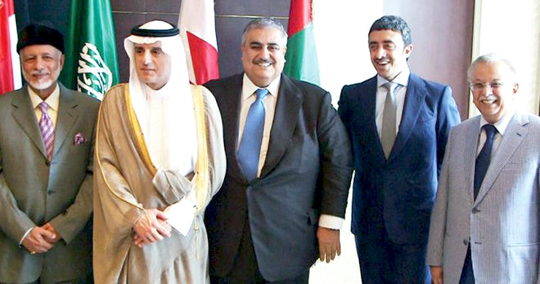Riyadh, Sep 20: Foreign ministers of the six-nation Gulf Cooperation Council (GCC) slammed Iran’s plots to politicize Haj, and called on Tehran to refrain from meddling in the affairs of the Arab countries.

The GCC foreign minister strongly advised “Iran to abide by the principles of good neighborliness, stop inciting sectarian strife and respect sovereignty of the Arab nations.”
The foreign ministers, who met on the sidelines of the 71st session of the UN General Assembly in New York, strongly rejected Iran’s deliberate interference in the internal affairs of other countries and its attempt to stir sectarian divisions among its own people. The GCC ministerial council meeting was chaired by Foreign Minister Adel Al-Jubeir.
The GCC ministers, who strongly commended the efforts of Custodian of the Two Holy Mosques King Salman for making elaborate Haj arrangements, also blamed the irresponsible Iranian regime, which deprived its own citizens from performing Haj this year. Iran unilaterally took its decision and barred its pilgrims from traveling to Makkah to take part in Haj after making false accusations against the Kingdom.
A communique issued after the GCC ministerial meeting outlined the importance of the “Saudi Vision 2030,” while mentioning a host of key regional issues; which are hampering all efforts for restoration of peace and security in the Middle East. The Vision 2030 is more relevant in the context of the theme of the general debate of UNGA session, which is “The Sustainable Development Goals: A Universal Push to Transform Our World.”
The general debate of the UNGA will open on Tuesday and run across Sept. 26. The UNGA hosted a high-level summit on Monday to address large movements of refugees and migrants, with the aim of bringing countries together behind a more humane and coordinated approach.
Referring to the subjects discussed and debated by the GCC foreign ministers at New York meeting, the statement said that the ministers expressed their deep concern over the US Congress’ adoption of the “Justice Against Sponsors of Terrorism Act,” which contradicts the established principles of international law, especially the equality of states in terms of sovereignty as stipulated by the UN Charter.
“The GCC ministers also stressed the firm position of GCC states in rejecting all forms of terrorism and extremism, and called for concerted efforts to combat terrorism financing,” according to the statement. The meeting reiterated GCC’s keenness on “restoring Syria’s unity, stability and territorial integrity.”
To this end, it is important to mention that US Secretary of State John Kerry on Monday called the week-old truce in Syria as “holding but fragile.”
Speaking Monday on the sidelines of the UN General Assembly, Kerry said some humanitarian assistance is moving but it is too soon to say, if it will meet the requirements of the cease-fire deal.
The truce took effect last Monday with the goal of creating a joint US-Russia military facility to coordinate airstrikes on the Daesh groups and Al-Qaeda affiliates. That was to be set up after seven days of reduced violence and sustained aid deliveries to Aleppo and other areas.
Referring to deteriorating situation in Yemen, the statement said: “The Arab coalition supporting the legitimacy in Yemen is the largest donor of humanitarian aid to that country.”
The GCC foreign ministers vowed to exert more efforts to achieve unity in Yemen and restore peace and security in that war-torn country.
The ministers also reiterated their support for unity and territorial integrity of Iraq. The ministers, who strongly condemned the assassination threats to the Saudi ambassador to Iraq, called on Baghdad to ensure protection of diplomats and diplomatic missions. The statement said that the GCC ministerial meeting also focused on Libya and Lebanon.
The GCC lent its support to Libya in the fight against the terrorist organizations. The meeting, on the other hand, called on various Lebanese factions to hold presidential elections to elect a new president. They also urged all influential groups in Lebanon to secure peace and stability on priority basis.





Comments
Add new comment